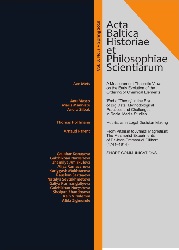‘End of Theory’ in the Era of Big Data: Methodological Practices and Challenges in Social Media Studies
‘End of Theory’ in the Era of Big Data: Methodological Practices and Challenges in Social Media Studies
Author(s): Anu Masso, Maris Männiste, Andra SiibakSubject(s): Media studies, Epistemology, Philosophy of Science, Methodology and research technology, Social Informatics, ICT Information and Communications Technologies
Published by: Tallinna Tehnikaülikooli õiguse instituut
Keywords: big data; computational social science; digital methods; end of theory; social media; social science methodology;
Summary/Abstract: Emerging digital data sources provide opportunities for explaining social processes, but also challenge knowledge production practices within social sciences. This article contributes to the ‘end of theory’ discussions, which have intensified in the social sciences since the widening practice of big data and computational methods. Adopting a systematic literature review of 120 empirical articles through a combined quantitative and qualitative approach, this article strives to contribute to the ongoing discussions on the epistemological shifts in social media big data (SM BD) studies. This study offers an insight into the development of analytical methods and research practices in SM BD studies during their rapid growth period in 2012–2016. The study findings only partially revealed the ‘end of theory’ claim: the problem setting of the studies is rather weakly related to theory, often neither hypothesis nor research questions are formulated on the basis of previous theories or research. However, this relatively weak relatedness to theory has not led to the descriptive type of inference, but rather exploratory, or predictive ways of reasoning. Instead of enabling predictions in social science research, SM BD raises issues of understanding the causes and effects in predictions for evaluating the social mechanisms of global disruptions. Developing ‘human research machines’ that exploit the cognitive resources of individuals should not be the aim of SM BD production. The outcome should be to recognise that the cognitive abilities of researchers, access to data, and developing novel methods are necessary for evaluating the global impact of social behaviour.
Journal: Acta Baltica Historiae et Philosophiae Scientiarum
- Issue Year: 8/2020
- Issue No: 1
- Page Range: 33-61
- Page Count: 29
- Language: English

